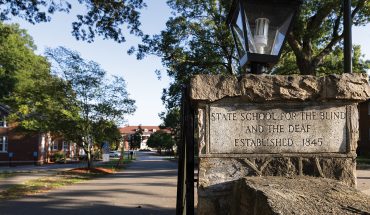
Skip Elsheimer of A/V Geeks holds one of the largest private collections of 16 mm educational films in the country.
by Kevin Flinn
photographs by Nick Pironio
Your teacher wheeled in the projector, unfurled the screen, and dimmed the lights. Within moments, the film crackled, the speaker hummed, the bulbs brightened, and it was show time. Perhaps you saw A Lunchroom Goes Bananas, or How Quiet Helps at School, or Anatomy of an Auto Accident. Maybe you watched Troubled Teens, or How to Survive in Your Kitchen, or Marriage: What Kind for You?
While most of us no doubt forgot these films as soon as we left the classroom, Raleigh’s Skip Elsheimer has dedicated himself to this quirky niche of the film industry. As custodian and caretaker of one of the largest private collections of 16 mm educational films in the country, Elsheimer and his company A/V Geeks collect, store, preserve, and maintain over 23,000 films in a nondescript Oakwood archive – a spot that doubled as his home until recently.
While Elsheimer has collected the majority of his films online or at auctions, many have shown up on his doorstep because schools and universities across the country have come to recognize A/V Geeks as the go-to repository for educational films. So instead of being tossed in the trash, these celluloid orphans are now able to find a loving home. Rivaled in size only by a few other private collections, Elsheimer’s cache continues to grow, as does his reputation as curator and exhibitor of the best (and sometimes, the worst) educational films ever produced.
Elsheimer’s career as a film archivist began “by mistake,” he says. In the early ’90s, as an undergrad at N.C. State, Elsheimer and his roommates visited state surplus auctions looking for “anything interesting – printing presses, riot gear, weird stuff.” One auction yielded a treasure trove of A/V equipment: audio decks, TVs, turntables, reel-to-reel machines, and a 16 mm film projector. His roommates soon scored 500 films for $50 at a flea market, and Elsheimer spent a weekend threading the projector and watching his future career unfurl before him.
That first batch, all from the state Department of Human Resources, ran the gamut of educational films, covering topics from drugs and alcohol to pregnancy, venereal disease, and atomic safety: “All the really great stuff,” Elsheimer muses. As he realized that the dawn of VHS meant that schools across the country were getting rid of 16 mm films, he started buying a thousand films here and a thousand films there. Soon they filled his apartment. As roommates moved out to get married or attend graduate school, more films moved in.
All in
As the 21st century dawned, Elsheimer’s interests trended even further toward the analog: He quit his full-time job at Raleigh-based Alien Skin Software and moved into the eight-bedroom former boarding house that now holds the A/V Geeks archive. His aim: to digitize the enormous library. For a while, his compilation DVDs of acquired films with titles like O is for Occult or When Computers Were Young sold fairly well at Best Buy and kept Elsheimer and A/V Geeks solvent, but when the big-box store decided to phase out his DVDs in the early 2000s, Elsheimer decided to take his archive worldwide.
His first foray was digitizing thousands of hours of film for a nonprofit digital library called The Internet Archive. It meant he got paid to do what he needed to do: preserve his treasure trove. Sixteen millimeter film is a medium that can’t survive on its own – as the prints break down, shrink, and buckle, the cellulose acetate plastic decays.
The work he started then continues today with the help of a paid assistant and a rotating handful of interns, meaning these long-forgotten films are now available to a certain type of cinephile. They come from across the globe to his shows in Raleigh and all over the country. Elsheimer’s Bastard Film Encounter allows films that are ill-conceived, embarrassing, or beyond the bounds of acceptability to finally see the light of day, and his Home Movie Day shows donated home movies at the State Archives.
And behind the scenes, Elsheimer and A/V Geeks work year-round as a digitizing and storage facility, archiving and locating stock footage for a broad range of customers, from universities to filmmakers to private collectors.
The island of misfit films
Entering the A/V Geeks archive is like setting foot in the government warehouse at the end of Raiders of the Lost Ark, only on a much smaller scale. Since Elsheimer and his wife moved out there’s a little more space, which allowed film-transfer and digitizing equipment to take up residence in the former master bedroom and part of the living room. Step through the kitchen, however, and you’re awash in an educational film mecca. Storage cans are stacked floor-to-ceiling. Towering gray, green, red, and yellow containers hold prints thought long-lost or long-destroyed. It’s here that Soapy the Germ Fighter resides alongside Living with the Atom and Ridin’ Cool to School. Call it the island of the misfit films, all rescued from oblivion and waiting their turn for digitization or exhibition.
It’s in showing his 16 mm marvels that Elsheimer’s passions truly shine. Not on his watch will films like The Changing Face of Florida and Save Those Teeth be forgotten. His first exhibitions were at the humble but groundbreaking Lump gallery and at the music venue Kings Barcade. Those events proved that Raleigh was fertile ground for the types of shows he wanted to curate. “I felt like I could get away with a lot more in Raleigh than I could in other cities,” Elsheimer says. “I had the chance to experiment with putting together shows. I was able to workshop and develop ideas.” Raleigh had venues “that were open to doing it, and receptive audiences.”
While expanding and perfecting his repertoire of shows, Elsheimer also took A/V Geeks on the road, putting on exhibitions of 16 mm educational films in New York, Chicago, and Los Angeles. He always comes home to Raleigh, however, with monthly shows at Kings, the North Carolina Museum of Natural Sciences, and a new series at the Hunt Library at N.C. State.
When Dr. Devin Orgeron joined the film studies department at N.C. State in 2002, he arrived with a hazy focus on non-theatrical film. His new colleagues asserted he “needed to meet Skip.” After attending one of Elsheimer’s shows, Orgeron was hooked. Elsheimer “almost single-handedly was the catalyst behind a sort-of shift in my career trajectory,” Orgeron says. “He turned my vague interest in non-theatrical films into a serious academic pursuit.” Since then, the two have collaborated on articles, presented at conferences, and worked as ambassadors for what Orgeron calls “this kind of material.” Orgeron has co-authored a book about educational film titled Learning with the Lights Off and included Elsheimer in his courses at N.C. State whenever possible. Last semester, Orgeron’s graduate students worked with A/V Geeks to digitize a collection of archival films from the State Archives and built and presented an exhibit displayed at Hunt Library on campus.
“One of the great things about 16 mm film is that it’s portable,” Elsheimer says. “Instead of having it in a very staid auditorium, I like to take it wherever I can.” Elsheimer marvels at the power a film has to draw in passersby: “People stumble upon it and wonder, ‘What is this?’ I like that opportunity to show a film to people who might not have expected to see a film.” It’s Elsheimer’s hope that these viewers – both intentional and accidental – spread the gospel of preserving the kinds of films that might otherwise be lost, either to acetate erosion or a dumpster.
“It’s the commitment of private collectors like Skip that keeps these histories alive,” Orgeron says. “Skip is not the A/V Geek – he’s a representative and spokesperson for all of us who are A/V geeks. There’s a kind of grassroots collectivity at work. It’s a movement, really.”







